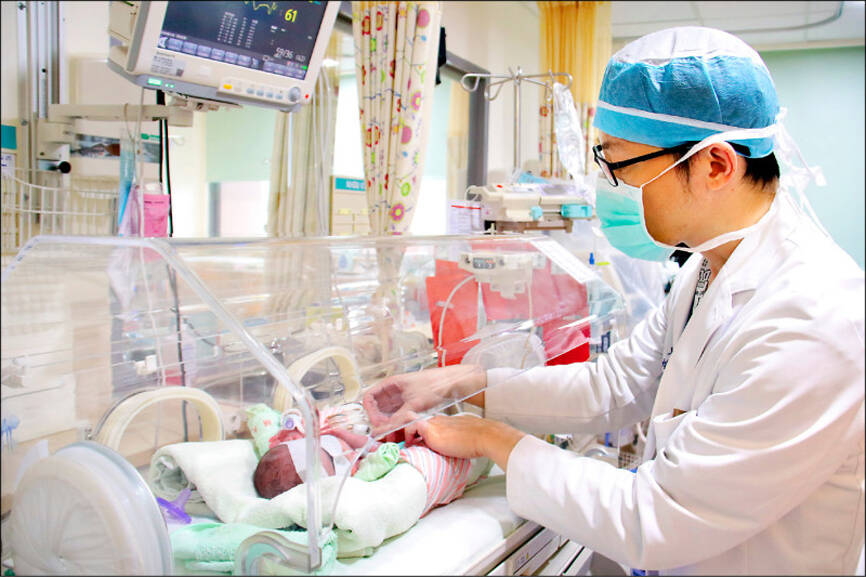Taiwan could face a pediatric surgeon shortage within the next decade, as the nation currently only has 73 practicing specialists, data from the Taiwanese Association of Pediatric Surgeons showed.
While some newborns might face their first moments of life in an operating room if they are born with conditions such as an imperforate anus, intestinal atresia or congenital urinary anomalies, a healthy future is possible — provided the conditions are quickly diagnosed and treated by a professional pediatric surgeon.
However, the number of pediatric surgeons in Taiwan has declined to 73 nationwide, most of whom were 40 to 60 years old, while those aged 30 to 40 made up only 13.9 percent, indicating an impending workforce shortfall within 10 years, the data showed.

Photo: Taipei Times
Association secretary-general Hsieh Ming-yu (謝明諭) on Saturday said that in Taiwan, educating pediatric surgeons is a long process.
A medical student, after graduating college, must undergo two years of post-graduate training, four years of general surgery training and four years of special training in pediatric surgery.
That means at least eight years of training, with another three years of clinical experience usually required for them to become fully competent, he said.
Association chairwoman Chen Yun (陳芸) said that many pediatric surgeons chose to leave the profession despite completing the lengthy training process, largely due to limited caseload caused by declining birthrates, tight work shifts and underallocated National Health Insurance (NHI) points.
For example, imperforate anus surgery is reimbursed at only NT$60,000 (US$1,819) under the NHI system, whereas the same procedure could cost up to NT$6 million in the US, she said.
The pediatric surgeon training system itself is also facing challenges, too, Chen said.
Training hospitals risk disqualification if they fail to meet the minimum number of benchmark surgeries required, she said.
However, the number of pediatric surgeon training hospitals has declined from 18 to 16 due to decreased caseload, with the National Taiwan University Hospital’s Hsinchu Branch and the Tri-Service General Hospital in Taipei being removed from the list, Chen said, adding that Kaohsiung E-Da Hospital is also facing removal.
A pediatric surgeon at a medical center speaking on condition of anonymity said that regulations fail to stipulate whether surgical operations for people aged 18 or younger must be performed by pediatric surgeons, so such operations are often taken over by surgeons from other departments, leading to fewer opportunities and lower income for pediatric surgeons.
When combined with factors such as high work pressure, staff shortages and demanding work schedules, it is increasingly difficult to attract the next generation of pediatric surgeons.
The government should not only boost funding by raising the NHI reimbursement rates for benchmark pediatric surgeries, but also provide incentives such as additional bonuses for operations performed on patients younger than 18, Chen said.
Increasing NHI payments for pediatric surgery would have a minimal financial impact on the NHI system, as the profession’s reimbursements account for just 0.38 percent of the NHI’s global budget, Hsieh said, adding that the adjustment can significantly improve the future of pediatric surgery.

Taiwan is stepping up plans to create self-sufficient supply chains for combat drones and increase foreign orders from the US to counter China’s numerical superiority, a defense official said on Saturday. Commenting on condition of anonymity, the official said the nation’s armed forces are in agreement with US Admiral Samuel Paparo’s assessment that Taiwan’s military must be prepared to turn the nation’s waters into a “hellscape” for the Chinese People’s Liberation Army (PLA). Paparo, the commander of the US Indo-Pacific Command, reiterated the concept during a Congressional hearing in Washington on Wednesday. He first coined the term in a security conference last

A magnitude 4.3 earthquake struck eastern Taiwan's Hualien County at 8:31am today, according to the Central Weather Administration (CWA). The epicenter of the temblor was located in Hualien County, about 70.3 kilometers south southwest of Hualien County Hall, at a depth of 23.2km, according to the administration. There were no immediate reports of damage resulting from the quake. The earthquake's intensity, which gauges the actual effect of a temblor, was highest in Taitung County, where it measured 3 on Taiwan's 7-tier intensity scale. The quake also measured an intensity of 2 in Hualien and Nantou counties, the CWA said.

The Overseas Community Affairs Council (OCAC) yesterday announced a fundraising campaign to support survivors of the magnitude 7.7 earthquake that struck Myanmar on March 28, with two prayer events scheduled in Taipei and Taichung later this week. “While initial rescue operations have concluded [in Myanmar], many survivors are now facing increasingly difficult living conditions,” OCAC Minister Hsu Chia-ching (徐佳青) told a news conference in Taipei. The fundraising campaign, which runs through May 31, is focused on supporting the reconstruction of damaged overseas compatriot schools, assisting students from Myanmar in Taiwan, and providing essential items, such as drinking water, food and medical supplies,

New Party Deputy Secretary-General You Chih-pin (游智彬) this morning went to the National Immigration Agency (NIA) to “turn himself in” after being notified that he had failed to provide proof of having renounced his Chinese household registration. He was one of more than 10,000 naturalized Taiwanese citizens from China who were informed by the NIA that their Taiwanese citizenship might be revoked if they fail to provide the proof in three months, people familiar with the matter said. You said he has proof that he had renounced his Chinese household registration and demanded the NIA provide proof that he still had Chinese